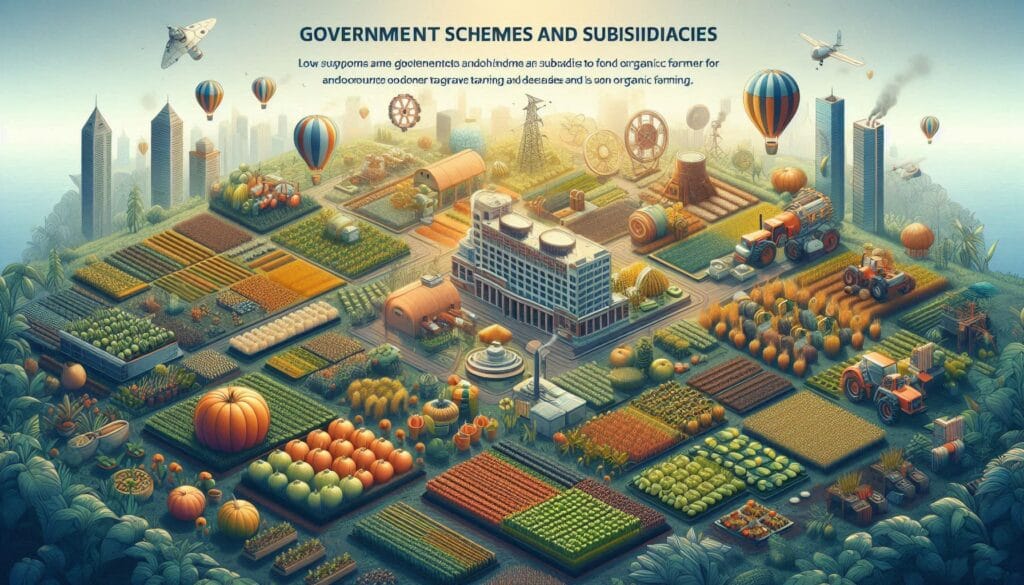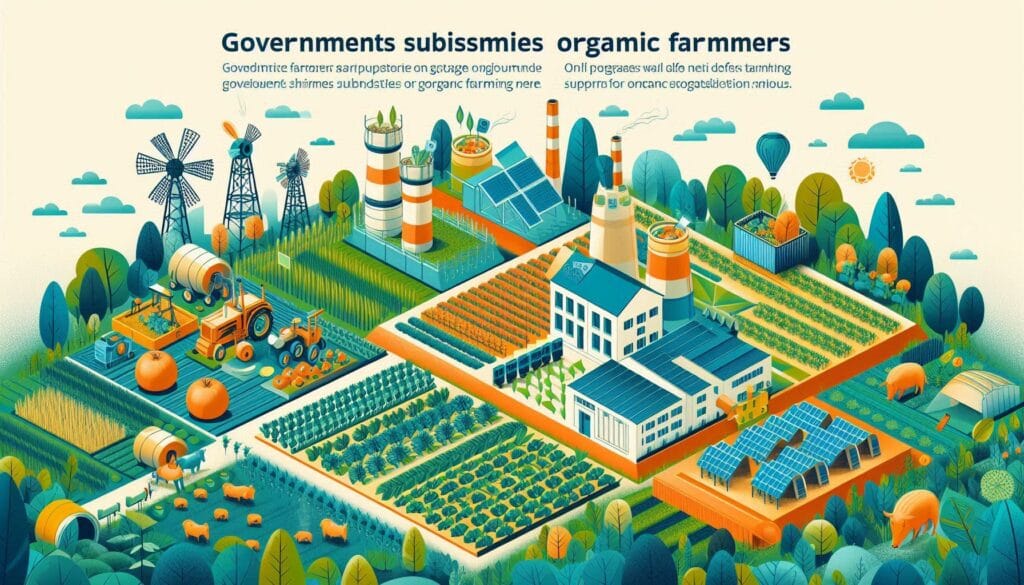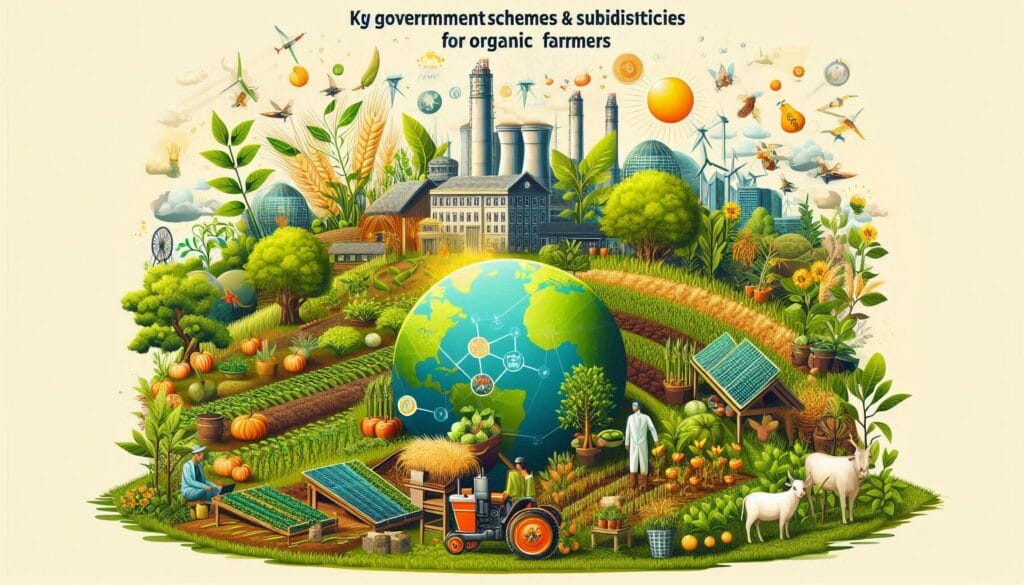The organic farming sector has grown immensely in recent years, and governments’ Support and Subsidies worldwide are recognizing its significance. To encourage farmers to adopt sustainable practices, various schemes and subsidies have been introduced. These programs not only provide financial aid but also offer training and resources to ensure the success of organic farming ventures. In this blog, we will explore key government schemes and subsidies for organic farmers, along with tips on how to access them.
Why Government Support is Crucial for Organic Farmers

Transitioning to organic farming can be challenging, especially for small and medium-scale farmers. Government support plays a vital role in:
- Reducing Financial Burden: Organic farming definition often involves higher initial costs, such as organic certification and natural inputs.
- Encouraging Sustainability: Subsidies promote environmentally friendly practices, benefiting both farmers and the ecosystem.
- Ensuring Food Security: Supporting organic farmers contributes to a healthier, more sustainable food supply chain.
Key Government Schemes and Subsidies for Organic Farmers
1. Organic Certification Assistance
Certification is essential for selling products as organic, but it can be costly. Many governments offer financial assistance for:
- Certification Fees: Covering a significant portion of the cost.
- Training Programs: Educating farmers about certification requirements and processes.
For example, the USDA’s National Organic Certification Cost Share Program (US) reimburses up to 75% of certification costs.
2. Subsidies for Organic Inputs
Organic farming relies on natural inputs such as compost, organic fertilizers, and bio-pesticides. To make these affordable, governments provide:
- Grants for Compost Units: Funding for setting up composting facilities.
- Discounted Prices: Subsidized rates for certified organic inputs.
In India, schemes like Paramparagat Krishi Vikas Yojana (PKVY) offer financial support for organic input purchases.
3. Financial Aid for Infrastructure Development

Building infrastructure is crucial for organic farming success. Subsidies and loans are available for:
- Irrigation Systems: Setting up drip or sprinkler irrigation to conserve water.
- Storage Facilities: Constructing cold storage units for organic produce.
- Renewable Energy: Installing solar panels or biogas plants.
4. Training and Capacity Building Programs
Knowledge is power, especially in organic farming. Governments fund:
- Workshops and Seminars: Hands-on training for farmers.
- Farmer Field Schools: Practical demonstrations of organic techniques.
- Online Resources: Free access to guides, webinars, and courses.
5. Market Access and Promotion
Connecting organic farmers with buyers is critical. Support includes:
- Exhibitions and Fairs: Opportunities to showcase organic products.
- E-Market Platforms: Subsidized access to online marketplaces.
- Branding and Packaging Support: Assistance in creating market-ready products.
How to Access Government Support
1. Research Available Schemes
Start by exploring programs offered by your local, state, or national government. Websites of agricultural departments or agencies are great resources.
2. Register Your Farm
Most schemes require farmers to register as organic producers. Ensure you have the necessary documentation, such as:
- Proof of land ownership or tenancy.
- Certification documents (if applicable).
- Farm plans outlining organic practices.
3. Apply for Subsidies and Grants
Follow these steps:
- Fill Out Applications: Complete forms accurately and attach required documents.
- Submit Before Deadlines: Keep track of application timelines.
- Seek Help if Needed: Consult local agricultural offices or cooperative societies for guidance.
4. Join Farmer Cooperatives
Being part of a cooperative can increase your chances of accessing support. Cooperatives often have the resources and connections to assist members in applying for subsidies.
5. Stay Updated
Government policies and schemes evolve. Subscribe to newsletters or join farmer networks to stay informed about new opportunities.
Examples of Successful Government Support

Case Study 1: Organic Farmer in the US
A small-scale organic farmer in California utilized the USDA’s Environmental Quality Incentives Program (EQIP) to install a drip irrigation system. This not only reduced water usage but also increased crop yields.
Case Study 2: PKVY Beneficiary Organic Farming in India
Under the PKVY scheme, a group of farmers in Rajasthan received funding for organic certification and composting units. Their collective efforts resulted in higher incomes and healthier soil.
Specific Examples of Changes:
- Instead of just mentioning the USDA’s program, link directly to the program’s website.
- Similarly, provide a link to the PKVY scheme in India.
- Add a sentence like, “According to [source], the global organic food market is projected to reach [value] by [year].”
- In the “Challenges” section, add a sentence like, “Many farmers find it helpful to seek assistance from local agricultural extension offices or NGOs that specialize in helping farmers navigate these processes.”
Challenges in Accessing Government Support
Despite the availability of schemes, farmers often face hurdles such as:
- Complex Application Processes: Lengthy paperwork can be overwhelming.
- Lack of Awareness: Many farmers are unaware of available subsidies.
- Delayed Disbursement: Funds are not always released on time.
Conclusion
Government support and subsidies are game-changers for organic farmers, providing the financial and technical resources needed to succeed. By leveraging these programs, farmers can overcome challenges, improve their practices, and contribute to a sustainable future.
If you’re an organic farmer or aspiring to be one, take the time to explore and utilize the schemes available in your region. With determination and the right support, the possibilities are endless.
Here are 5 quick questions and answers about government support and subsidies for organic farmers:
1. Question: What is one of the main financial burdens that government subsidies help organic farmers overcome?
Answer: The higher initial costs associated with transitioning to organic farming, such as organic certification fees and the purchase of natural inputs.
2. Question: Besides financial aid, what other types of support do government schemes often provide to organic farmers?
Answer: Training and capacity building programs, assistance with infrastructure development (like irrigation and storage), and support for market access and promotion of organic products.
3. Question: What is one example of a government program that helps with the cost of organic certification?
Answer: The USDA’s National Organic Certification Cost Share Program (in the US) reimburses a significant portion of certification costs. The post also mentions India’s Paramparagat Krishi Vikas Yojana (PKVY) which offers financial support for organic input purchases, implicitly including support for the certification process which is a prerequisite.
4. Question: What are some challenges that farmers often face when trying to access government support?
Answer: Complex application processes with lengthy paperwork, lack of awareness about available subsidies, and delays in the disbursement of funds.
5. Question: Why is government support considered crucial for the growth of the organic farming sector?
Answer: It helps reduce the financial burden on farmers, encourages sustainable and environmentally friendly practices, and contributes to a healthier and more sustainable food supply chain, ultimately ensuring food security.



Pingback: About Organic Farming